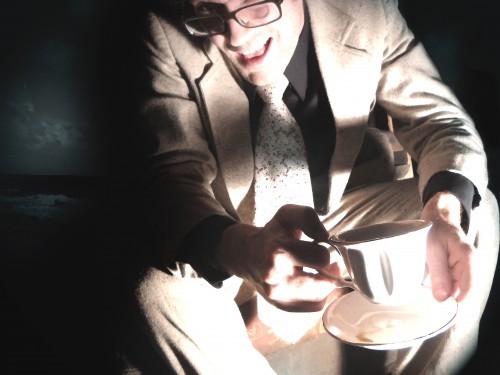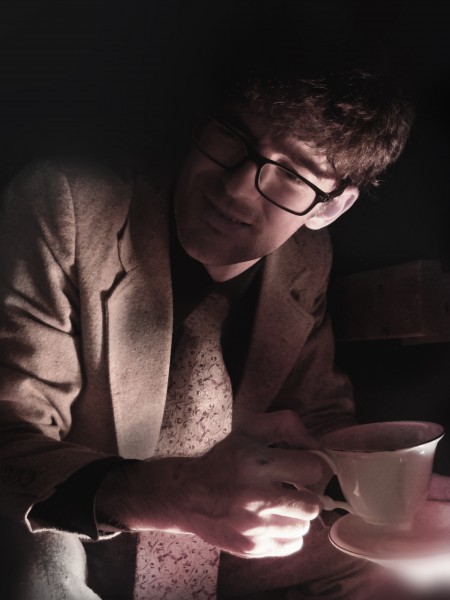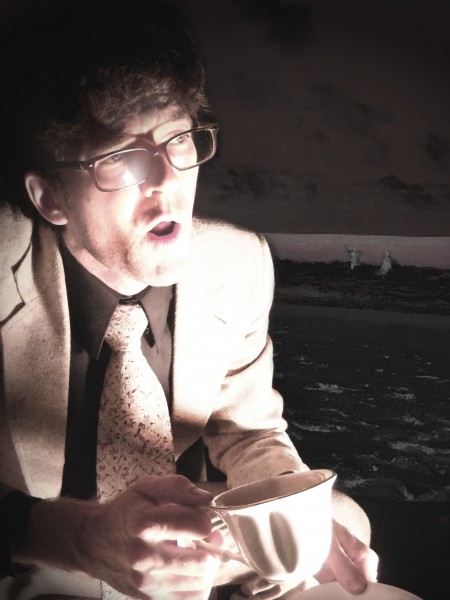I Destroy Your Signifiers: Talking with Doug Cheatwood
 Eight or nine years ago, I wrote a negative review of a Doug Cheatwood album, and I’ve been hooked ever since.
Eight or nine years ago, I wrote a negative review of a Doug Cheatwood album, and I’ve been hooked ever since.
In 2004, I couldn’t wrap my head around it fast enough to write the review I wish I’d written, but after I’d listened to each successive record obsessively for all these years since, Doug sent me yet another devastating CD, Who’s A Fuzzy Buddy?, this time by he and his band The Bastards of Fate, and we got to talking about it at length.
Doug throws everything but the kitchen sink at these albums. His music is sweet and terrifying. I hear Crash Worship and Polyphonic Spree in the same song very, very often. Some songs begin or end with angelic singing but have the strength and tone of a natural disaster in between. I’m drawn in by those extremities and kept in rapt attention by the complexity.
SCR: Are all of these songs that I have heard before on other records? I like them a lot. I’ve always loved the line “Digging up the dinosaurs and putting them together,” from “Digging Up Dinosaurs.” It works literally, like you could be describing archaeology. In this case, I thought it might have to do with your repurposing parts of older pieces. But when I first heard an incarnation of that song — eight years ago — I thought it had something to do with you coming up with an original interpretation of ancient ideas and accepted truths.
Doug Cheatwood: Each of those interpretations work. I like those better than the emotional/relationship one, which is the one most people tend to gravitate toward, for whatever reason. Another that I’ve thought about is an interpretation involving fossil fuels and modern technology. I honestly can’t remember what I was thinking about at the time I wrote it, but I do think the open-endedness has allowed the song to survive as long as it has. It’s a big, dumb song about a very broad idea.
And, could “the sweetest little lie ever told” have to do with your background growing up — as I did — in a Christian school?
“The Sweet Touch” is written from the perspective of a character. At the time I wrote it, I was reading Lolita for the first time, and I was thinking about the purpose of art, and more specifically, what I wanted my art to do.
The song plays with the stereotype of the predator luring an innocent victim with the promise of candy and equates the effects of myopic morality on the soul with the corrosive effect of sugar on teeth. It was the jumping-off point for a lot of things I’ve written since then from what I’d describe as a bipolar perspective — someone pulled always between despair and megalomania.
I have a fascination for people who become something other than what they hope for, either through compromise, weakness, or circumstance, and then wake up one day and have to deal with the fact that they have become monsters. The situation has snowballed and changed who they are into someone they cannot accept. That dovetails back into religion; it’s hard to think of another way out for someone like that.
Are you an atheist? When I first heard your music, I kept trying to tie in little themes with your having grown up in a Christian school/church/home, much as I did. I’m kind of over that now, but since these are older songs… You know who else I do that to? Daniel Johnston. He and I grew up in the same brand of church, he in West Virginia and me in Kentucky, and wound up at Abilene Christian University, then Austin, Texas.
 By the way, I also like a literal interpretation of all of your songs. Because there is something very familiar, nightmarish, endearing, and educational about them. Each of them. But my problem is that I’ve listened to them so many times that I begin to assign more and more meaning to them, eventually. After all, it is art. So it’s likely to have more than one meaning. Right?
By the way, I also like a literal interpretation of all of your songs. Because there is something very familiar, nightmarish, endearing, and educational about them. Each of them. But my problem is that I’ve listened to them so many times that I begin to assign more and more meaning to them, eventually. After all, it is art. So it’s likely to have more than one meaning. Right?
Yes, yes. I think art should have multiple levels of meaning. It should reflect the perspective not just of the artist, but the person taking it in, and the world around it. It should be able to move through time and adapt and absorb things. The best art does that. There should be mystery, as well as depth of feeling.
Recently I’ve been considering, warming to the idea, that Christ is a necessary part of humankind. He’s a name that we’ve given to something that is a part of our internal architecture. You could say that he’s a symbol, or an idea, and I don’t think you’d be incorrect, but I also don’t think those descriptions do justice to His power, or His reality. Saying Christ is a Person conveys the depth of what we’re talking about. Because of this, I’ve been much more hesitant to describe myself as an atheist.
People aren’t purely rational, obviously. There are emotions and impulses, and forces deeper than those things that we still barely understand. Forces that drive us, and hold us together. We take that internal world, those structures, for granted until something knocks a beam out, or we meet someone whose internal world is unstable. People who destroy themselves, or others. Those people need Christ, we need Christ, at those times, to restore balance.
If you want to see that in action, go to AA and watch what happens with people who follow the program. There doesn’t have to be any crying or anything. They just have to pick a Higher Power, give it a name, and hand over control.
As far as Christ being the creator of the Universe, well, there’s the idea that when we become conscious of things, we are, in a way, creating them. Again, I know that’s not what the church people are thinking when they say He’s the Creator. If you’d like to say I’m an atheist, I guess that’s technically what I am, maybe. If you’d like to say I’m Christian, you could put me with Salinger, or maybe Dostoyevsky. Maybe Carl Jung, if you’re feeling punchy. Just not Kierkegaard, fuck that guy.
Still, don’t hold me to any of this. Work in progress, as always. I reserve the right to change my mind.
 Terrific. Is that an answer I could publish? It’s up to you… I don’t remember where I got the idea to ask you that in the first place, really. Except there used to be a bio on your Website — eight years ago or something — that talked about how you grew up. And when I heard your first four or five records, there were some themes of destroying things. Or at least putting things behind you, and reconstructing things. And I’m not just talking about the dinosaur song, either.
Terrific. Is that an answer I could publish? It’s up to you… I don’t remember where I got the idea to ask you that in the first place, really. Except there used to be a bio on your Website — eight years ago or something — that talked about how you grew up. And when I heard your first four or five records, there were some themes of destroying things. Or at least putting things behind you, and reconstructing things. And I’m not just talking about the dinosaur song, either.
It’s like this: many of your songs start with some monolithic structure — I picture a bridge or a giant building or, more specifically, a casino, for some reason — and quickly moves towards tearing it down. My friend Jon and I were discussing it, and we joked that it sounds like a high-rise building filled with wind chimes and musical instruments and sound effects being dynamited, and it’s music to your ears. Like you record that, and mix that, and orchestrate it…add strings, a choir, etc. But there’s a sweet little pop song underneath it all, like the requiem for all that destruction — every time.
I think I would be okay with you publishing it. The context it’s missing is that, yeah, I’m very aware of the nightmare side of religion. I mean, I grew up fundamentalist, like you. The creepiness you get exposed to is pretty off-putting. You know that. It’s easy enough, once you’ve worked your way out of that world, to dismiss any kind of spiritual thinking as delusion, or wish fulfillment or some kind of mind virus, or just plain silliness. All I mean to say is, don’t be so quick to do that.
I think we live in a society that undervalues symbols. This makes the Christians think that saying Christ is a symbol is the same thing as saying that He is not real or not important. And it makes atheists think Jesus is basically the same thing as a Flying Spaghetti Monster, which He isn’t. Plenty of societies have considered dreams and symbols to be very real and important, sometimes more so than what is tangible. In our society, even religious people think of a dream as something you can dismiss. Church people have to have a literal Bible, and literal Jesus, and if the evidence doesn’t add up, the historians and scientists must have it wrong. Jesus is real, dammit! Not a symbol!
This ignorance of our own internal world, I think it’s fucking things up pretty severely. Science is awesome; it’s an amazing way to understand the universe. But we have to look inward, too. Art is a great way to do that on a public platform, so that everyone can consider what’s being presented. It doesn’t have to be overtly didactic. It just needs to make people stop and consider, to look inward.
Wow. That’s terrific. I need a while to think about that.
Feel free to tell me I sound totally stoned. Yeah, I definitely want to read through this beforehand. I think I am conflating terms and stuff. This is why I’m terrible at interviews. I just cannot stop picking.
I like the image of a building full of instruments being dynamited. One image I’ve kept in mind since I started writing songs is Disney World. I like the songs to be like rides, with drops and turns, but also set dressings and characters and colors and time travel. Different rooms and plot points and waterfalls and smoke. And cheese. I went to Disney World a couple times as a kid, and I think it impressed me a lot.
 At this point in the life of the band, we come up with the arrangements as a group — though several of the arrangements on the album you have are based on earlier versions. There is a lot of banter, and jokes, during practice, and usually that makes its way into the music. If we have any rule or idea that gets deployed consistently, it’s that we try to destroy the songs as we write them.
At this point in the life of the band, we come up with the arrangements as a group — though several of the arrangements on the album you have are based on earlier versions. There is a lot of banter, and jokes, during practice, and usually that makes its way into the music. If we have any rule or idea that gets deployed consistently, it’s that we try to destroy the songs as we write them.
So, yes, destroying things. We do that. We’ll have a section that is very pretty and we’ll immediately want to add fake harmonica and nü-metal yelling. Or have something that sounds genuinely hurt and angry and add a line about hamburgers and a slide whistle. I can’t speak for the others, but for me personally, while I love music, I think I also simultaneously hate it.
Like, all these signifiers — an acoustic guitar is supposed to mean you’re sensitive or authentic, angular guitars means you’re hip, double-kick means Satan or beer, a piano means you’re earnest — just, ugh, fuck all of that. Seriously. Fuck it. It’s garbage. It means nothing. I take all that, and I stomp on it. It means nothing. Fuck you if you think an acoustic guitar means anything at all. I say it doesn’t. I destroy your signifiers.
That being said, we almost never mess with the actual melody or the chords. Only the presentation. So you’re right. There is always a pop song in there.
I had a debate recently with my girlfriend, which subsequently turned into a debate with Jason [Wells, bassist], as well, about whether a song can be good apart from its actual performance. Like, does a song exist as a platonic ideal, apart from whoever might sing it on a particular night, and have a quality as such? Or is the performance the song?
Like, I argued that “Somewhere Over The Rainbow” is a beautiful song, and you can recognize that despite a poor performance. Their argument was, if that were the only performance of the song in existence, then that would be the song, and it would be a bad one. I still think you would be able to hear the intent and the potential, and be able to discern a beautiful song from it. What do you think about this?
Here’s an answer. I’ve never really liked the earliest Beatles songs. I’m too young, I guess, because they just seemed poppy and innocent and the least edgy thing on Earth.
 Then a couple of years ago I heard Chris Cornell deconstruct “Ticket To Ride” at the Paramount Theater in Austin. He played it for 15-20 minutes or something, using feedback and loops and 100% of his voice. And I felt like I got it for the first time. The version he did sounded more like Sonic Youth on a weird day. But it helped me put the Beatles into context.
Then a couple of years ago I heard Chris Cornell deconstruct “Ticket To Ride” at the Paramount Theater in Austin. He played it for 15-20 minutes or something, using feedback and loops and 100% of his voice. And I felt like I got it for the first time. The version he did sounded more like Sonic Youth on a weird day. But it helped me put the Beatles into context.
Something like that? It’s kind of the opposite of what you said.
They would say that those were two different songs.
It’s a pretty dense discussion. I only bring it up because a lot of times I feel like what we are doing when we flesh out an arrangement is testing that idea. That the performance is, in a way, hanging things on a skeleton, which is the song. I feel like some skeletons are sturdier than others, so they can sustain more. I don’t think that’s only in my my head. Some combinations of melody and words seem almost impervious.
Can I confess that I really hate interviews? You are the best interviewer I could possibly hope for, and I’m still obsessing over what I’ve said, if I’ve explained myself well enough. Creating yourself in the public sphere, outside of just making music, is very nerve-wracking for me.
I mean, it’s necessary, I’m trying to learn how to do it. In an interview, there’s not as much room for ambiguity as there is when you are making art. The palette’s not as broad, the opportunity to create more context is infrequent. It’s hard to switch things around. I keep wanting to go back and say, “No, no, that’s not quite what I meant.” I want to go back and contradict everything I’ve just said. Create an inverted interview with a bizarro version of myself, to put beside this one.
Well, I read this out loud to my wife, and she said it was the smartest conversation she’d ever heard. Honestly, I think you can come off sounding like a total genius. Okay, this got a little too heavy, so let’s end on a lighter note: how did you you choose to celebrate Chick-Fil-A Appreciation Day?
Flattery. But thank you. And, no such thing as too heavy. I actually didn’t realize there was such an appreciation day until I looked at the newspaper a few minutes ago. So, I did not celebrate, or react in any way.
I chose to spend it recognizing Jerry Garcia’s 70th birthday… END



Leave a Reply